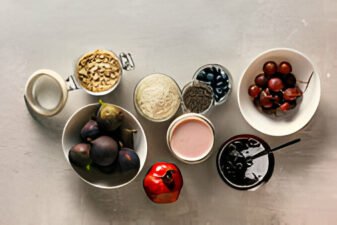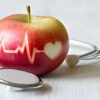Healthy Balanced Diets Come in Various Forms
There is no one type of balanced diet, with a fixed amount of fat, carbohydrate and protein, that suits everyone. An elderly person may need a different balance of foods to that of a teenager. Or an obese diabetic may need a different type of balanced diet to that of an underweight athlete, and so on. Also, tastes and digestive preferences vary considerably. Thus a healthy diet may take a variety of different forms with differing proportions of fat, protein and carbohydrate.
Healthy Eating in a Nutshell – Nutritional Quality Counts
Instead of focusing on calorie-counting, carb-counting or fat-counting, focus on the nutritional quality of the food. For example, choose less-processed foods (eg. oats) rather than highly processed alternatives (eg. regular breakfast cereal). Choose whole grain carbs (eg. wholegrain rye bread) rather than refined versions (eg. fluffy white bread). Choose extra low fat ground beef/steak, rather than fattier alternatives. Choose unrefined or extra virgin vegetable oils, rather than the refined brands. Choose foods that require a little cooking, rather than instant foods.
Chances are, the more processed or refined the food is, the less healthy and nutritious it is likely to be.
Refined Foods Cause Us to Overeat
According to a recent study, at least 58 percent of the calories in a typical Western diet come from empty calorie foods, meaning: white fats, white (refined) oils, white sugar, white flour products and alcohol, most of whose minerals, vitamins and fiber have been removed by processing and refining. These refined empty calorie foods are likely to cause us to gain fat, because they cause us to overeat.
One of the mechanisms that turns off hunger is a feeling of fullness. By the time we’ve filled up on these concentrated-calorie, fiber-poor foods we’ve eaten more calories than we need – and the excess turns to fat. When we obtain adequate amounts of all essential nutrients, biological hunger ceases. If our foods are nutrient-deficient we may overeat until we get them which is one reason why nutrient enrichment is important for achieving a healthy weight.
We Absorb More Calories From Refined Foods
Because they lack fiber and bulk, high calorie refined foods also slow down intestinal activity. They take up to five times longer to pass through the intestinal tract than do natural unrefined high fiber foods (75 hours compared to 15) and the body absorbs calories during the entire time of their constipated passage.
Non-Nutritious Refined Foods More Likely to be Stored as Fat
Foods cannot be metabolised properly without minerals and vitamins. The energy that empty calorie foods contain becomes unavailable to our body and is stored as fat until (or in the hope that) we get the necessary minerals and vitamins at some later time. In the meantime we feel hungry and eat more. This too turns into fat unless minerals and vitamins are also provided.
Non-Nutritious Refined Foods Reduce Calorie-Burning
Minerals, vitamins and essential fatty acids are systematically removed from foods during refining. Their absence lowers our metabolic rate; we feel less like being active and become lethargic. Then even if we eat less we don’t burn up the calories we eat and get fat even on a low calorie diet.
Our Digestive System
Our food digestion system (mouth, esophagus, stomach, small intestine, large intestine) helps us to convert and absorb energy and nutrients from food. Carbohydrate, fats and protein are each digested differently within the upper gastrointestinal tract, but surplus calories from these three micronutrients are ALL converted to body fat. Malabsorption, an unhealthy diet, infections and food toxins can cause a range of digestive disorders including: Indigestion, Dyspepsia, Constipation, Diarrhea, Gastroenteritis, and other digestion problems, or even food poisoning.










